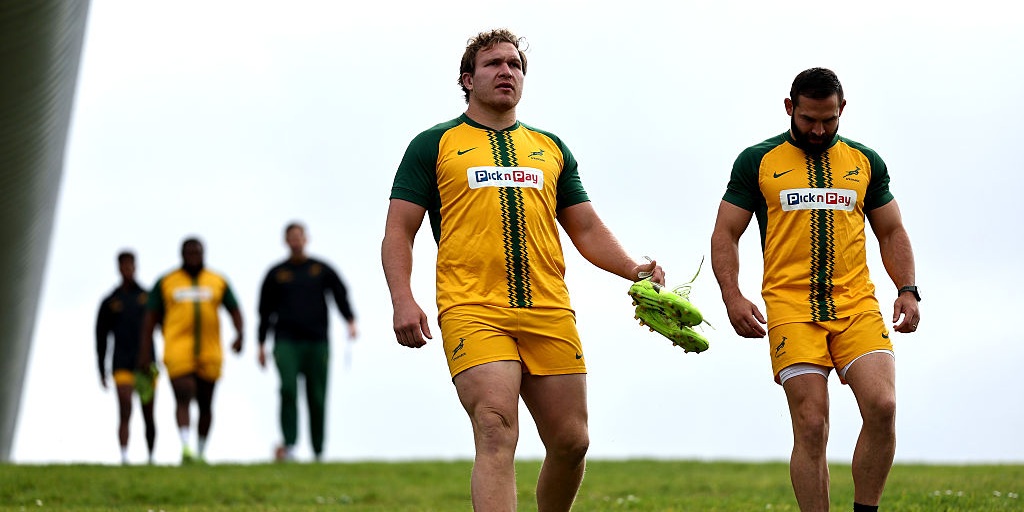Alexander the Great is said to have wept when he discovered that there were no more lands to conquer. This is a misinterpretation popularised by Alan Rickman’s character in Die Hard, but the resonance endures: a general, standing at the precipice of history, surveying his achievements and recognising that he has traversed every possible frontier.
Rassie Erasmus finds himself in a similar position. South Africa’s mad genius has ticked just about every box. He’s won every trophy, beaten every opposition, seen his team climb to the top of World Rugby’s rankings and won the hearts of millions. Yet one patch of turf remains unconquered. Unless he rights this wrong, his record will remain incomplete.
Eden Park. The name itself carries a crack of doom. Say it out loud to any rugby fan and it’ll send a shiver down their spine. Verdun. Mordor. Eden Park. Abandon all hope, ye who enter here.
Erasmus isn’t taking any chances. The team has a familiar feel. “Tried and tested,” said the SA Rugby release. There are 434 caps in the backline and 505 among the forwards; 939 in total, the fourth-highest combined tally in Bok history.
In a way, this is a step backwards. Erasmus won two World Cups partly through sacrifice between tournaments: blooding new players, experimenting with combinations, absorbing bruising defeats in pursuit of the bigger picture. Pragmatism was often delayed in the name of keeping his squad refreshed. This latest sheet, however, suggests no time for gradualism. Not when Eden Park is the prize.
Fixture
Rugby Championship

New Zealand

South Africa
Handré Pollard keeps his place, underlining the need for points and control. Inside him Grant Williams can spark broken play but will likely revert to a metronomic approach. The All Blacks will target the inexperienced half-back, so solidity behind the pack is non-negotiable.
Go-forward ball will be vital. Pieter-Steph du Toit returns to the back row but it remains to be seen if he’ll operate in the trams. Tony Brown’s attacking blueprint has stationed Bok loose forwards wide to create mismatches, but this has left midfielders isolated and picked off. Australia did so with ruthless efficiency in Johannesburg; the All Blacks did likewise last year. It would be a staggering blunder if the Boks repeat it.
Does this mean Siya Kolisi will remain closer to the ball? The talisman has lost the armband to Jesse Kriel and has been shifted to no. 8, a role he filled for the Sharks but one far from his first choice.
South Africa must win the point of contact. Malcolm Marx continues to start with Eben Etzebeth in the tight channels. But further out is where this will be decided. Kolisi, du Toit and Damian de Allende simply have to dominate. Short passes, hard runs, wave after wave of green bodies: Erasmus is telegraphing his intent. If it works, Williams and Pollard can dictate tempo.
And then, Willie le Roux. The veteran fullback wasn’t in the original squad. At 35, his days as a starter seemed over, his role reduced to mentor for Aphelele Fassi and Damian Willemse. At best he would become an impact sub in games of little consequence. Yet here he is, parachuted in and thrust into the most important Test of his life since the 2019 World Cup final. Erasmus, who has always valued his vision, has reached beyond his official squad to ensure his presence at Eden Park. That, in itself, tells the story.
Rugby Championship
P
W
L
D
PF
PA
PD
BP T
BP-7
BP
Total
1

2
1
1
0
6
2

2
1
1
0
5
3

2
1
1
0
4
4

2
1
1
0
4
New Zealand will target the veteran, as well as Canan Moodie on the left wing. Both are wonderful with ball in hand – le Roux the visionary playmaker, Moodie the dynamic game-breaker – but vulnerable on defence. Even at his peak, le Roux was shaky under the high ball; Moodie has often been the loose cog in the rush defence. Both will need something close to the defensive game of their lives.
Because the bench – so often a difference maker for the Boks – doesn’t quite pack the punch of a vaunted bomb squad. A 5-3 split is perhaps the only departure from Erasmus’ dog-eared playbook. Ethan Hooker, Jan-Hendrik Wessels and Boan Venter have less than 10 caps between them. In a contest of fine margins, the lack of late-game experience could yet prove decisive.
Which is why the starting XV carries so much weight. Erasmus has gambled on veterans, on scar tissue and muscle memory, on the idea that players who have won the biggest prizes in the sport can find one more peak to climb. It is not a blueprint for the future, nor is it meant to be. This is a team for one night only, one purpose alone: to storm a fortress that has not been breached for 30 years. Le Roux was just six when France triumphed 23-20 in 1994. Pollard hadn’t learned to walk. Williams, Venter, Moodie and Hooker weren’t born yet.
A win would be another marker of this side’s greatness. It would be the moment South Africa broke through rugby’s final barrier, the achievement that silences caveats and completes Erasmus’ ledger. For the players, it would be the sort of triumph to tell their grandchildren about; for the coach, it would ensure his legacy is not only gilded in trophies but etched in myth.
Alexander supposedly wept because he thought there were no worlds left to conquer. Erasmus knows there is still one, looming on the far side of the world. If the Boks can topple the All Blacks in Auckland, history will record it not just as another victory, but as the night South Africa proved that even the most unassailable fortress can fall.

